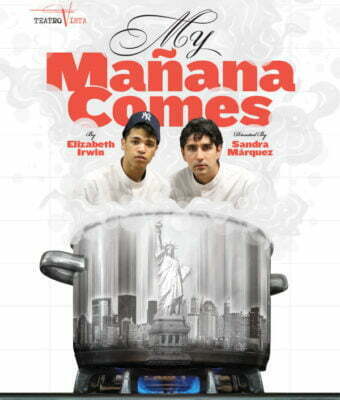My Mañana Comes
Directed by Sandra Márquez
Produced by Teatro Vista
Playing at The Victory Gardens Biograph Theater, Chicago
Fan Service For the Political Man
Teatro Vista opened its 25th Anniversary Season this week with Elizabeth Irwin’s My Mañana Comes, a drama about the back-of-house lives of four busboys that endure the grind of their daily jobs in order to pursue their own ideas of the “American Dream.” At times humorous, at times interesting, My Mañana Comes fails to transcend its average American purview and delivers a story that is frustratingly slow-paced and over sentimental in its attempts to humanize its characters, making it just another one of the many “social conscious” plays after which its viewers can congratulate themselves for their sympathetic understanding and selfless endurance.

My Mañana Comes takes place in the back-of-house of an upscale, New York restaurant where four busboys bustle and grind their daily lives away for their “American Dream.” Jorge (Víctor Marañas) is a first-generation Mexican immigrant who’s been working for four years at the restaurant in order to save up enough money to build his wife and children back home a new house in Mexico. Pepe (Jonathan Nieves) is also a first-generation Mexican immigrant, but, being much younger than Jorge, his dream is not to return to Mexico but to bring his brother over so they can begin a new, rich life together in America.
Working alongside these young men are Peter (Cameron Knight) and Whalid (Dennis García). Peter, in some ways analogous to Jorge, is a veteran busboy and works for his wife and daughter, trying to sustain a reasonable income in order to pay for his daughter’s education. Whalid is more similar to Pepe in that he is new to bussing and his dream (to raise enough money to take an EMT course) is beset by the temptations of materialism – the trappings of a wealthy lifestyle, sans the wealth.

While these four men work in relative friendliness and unanimity in their pursuit of a living wage (sometimes punctuated with varying degrees of offensive joking), their allegiance to each other is put in crisis by the unscrupulousness of their manager and owner – two individuals who, though they never appear, are continually invoked. This crisis forces each of the men to consider his own well-being and to act from whatever principle he holds dearest for the sake of his own, particular dream.
To my mind, this is the synopsis to an intriguing, moral play that explores the principles people hold, and how, beneath the ribbing, workplace kindliness, at the end of the day an individual’s pursuit of his dream is just that: solitary and independent. The conclusion to Irwin’s play shows this nicely.
However, this summation is not exactly the thrust of Irwin’s play. Instead, the eighty minutes preceding the conclusion overwhelm the tenuous plot concerning wages and serve a different, more political end: the relentless attempt to instill understanding and sympathy in the audience for the characters. This is especially highlighted in the candid “I-have-a-dream” monologues and soliloquies Irwin has each of her characters recite. Although dramatic irony is beautiful (for instance, as it transpires in an Arthur Miller play), when repeatedly harped upon for eighty minutes without the propulsion of a tangible plot or a compelling conflict it is heavy-handed, condescending sentimentality.

What Irwin fails to realize – and what most timely, “social conscious” plays seem not to understand – is that sympathy for a character – the “humanizing” of him or her – is born of witnessing that character in conflict in the immediacy of the stage setting – and it happens without the need for sympathetic digressions. Beggars on the street hold signs listing their problems, or else they try to convince us of their present conflict by telling us their stories. But, lacking the understanding conveyed through experiencing these troubles directly, we are left with superficial estimations of their veracity without, one may call, the lived reality of their truth. The feeling, I would contend, elicited by such encounters is not so much sympathy as it is guilt: guilt that we, who do not have to beg, are better-off. Even if one were to insist that this is indeed sympathy, it is still not the elevated, cathartic sympathy that is found in theatre: it is pandering.
The reason is that beggars tell, while the theatre shows. In eighty minutes, Irwin has her characters tell us (ad nauseam) about their conflicted lives outside the restaurant, conjuring much guilt in us who can afford the luxury of paying to sit in a theatre for ninety minutes to be entertained by it. Only in the last ten minutes do we actually get the chance to witness the conflict of these characters in the immediacy of their present setting, and only then do we begin to feel the earnest sympathy born of understanding, of experiencing the conflict with the characters.
If one can look past the weakness of the story – which, one may argue, delivers just what it advertises – the production itself has some redemptive value. For one, Víctor Maraña, as Jorge, captures respect, admiration, and pity for his character through his humble demeanor and accented, broken diction. Dennis García, too, as Whalid, bears his character with a natural, east coast air and dialect that bring an authentic abrasiveness to the role. Indeed, all the actors exhibit an energetic enthusiasm for their parts. Additionally, the set and prop design by Angela Weber Miller and Uriel Gómez, respectively, offer an impeccable recreation of a restaurant kitchen (for anyone willing to see a play upon that merit).
Nevertheless, My Mañana Comes is a political fan service for those who enjoy savoring their common notions of immigrant life and having their pity encouraged and congratulated in sentimental representations of reality. It is yet another stellar example of the subsumption of art under politics in contemporary American theatre.
Somewhat Recommended
August Lysy
Playing at The Richard Christiansen Theater at The Victory Gardens Biograph Theater, 2433 N. Lincoln Ave, Chicago.

